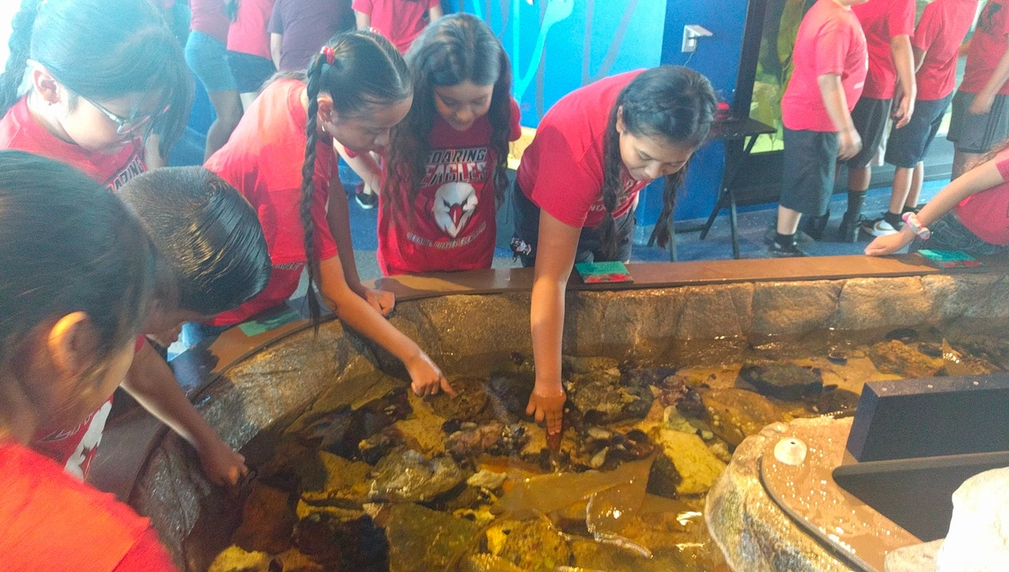Access Community Coastal Environmental Science Stewardship (ACCESS)
The ACCESS Program will provide two virtual and one in-person STEM programs to an estimated 2,500 K-12th grade students from low-income areas in the greater Los Angeles area. The NGSS-aligned programs will include ecosystem connections, ocean ecology, and human impacts on the environment. The in-person lesson will provide hands-on exploration at the Roundhouse Aquarium or through a visit to the students’ schools.

What is the primary issue area that your application will impact?
K-12 STEAM Education
In which areas of Los Angeles will you be directly working?
Central LA
East LA
San Gabriel Valley
San Fernando Valley
South LA
West LA
South Bay
Antelope Valley
In what stage of innovation is this project, program, or initiative?
Expand existing project, program, or initiative
What is your understanding of the issue that you are seeking to address?
STEM and Environmental education is limited in many Los Angeles area schools. Due to a variety of factors, teachers cannot make STEM and environmental education a priority. Studies show incorporating environmental education into classroom science curriculum improves students’ achievements in science (Lieberman, G.A. and Hoody, L.L., 1998. Closing the Achievement Gap: Using the Environment as an Integrating Context for Learning). A study by WestEd, the Lawrence Hall of Science and SRI International showed that 40% of elementary teachers spend 1 hour or less teaching science each week and only one third of elementary teachers feel prepared to teach science. The study was completed before the pandemic, which has created an even more urgent need to support STEM learning, particularly in marginalized communities. Field trips and presentations from outside experts can help bridge the STEM gap and provide students opportunities to increase their understanding of their environment.
Describe the project, program, or initiative this grant will support to address the issue.
Students who participate in ACCESS will receive a combination of virtual and in-person lessons from expert scientists at the Roundhouse Aquarium. Teachers will be able to choose between two themes: ecosystem connections or hidden ocean heroes. Both themes are aligned to NGSS and are able to be adapted for various grade levels. Our instructors will give two virtual live lessons, and one in-person lesson for the theme the teacher selects. The two live virtual lessons give students a chance to interact with a live scientist without leaving their class or impacting the rest of the days’ lessons. All themes discuss climate change, pollution, and the impact human actions have on our environment, and what actions students can take to be part of the solution. They will also include, videos, photos, live animals at the Roundhouse Aquarium, time for questions, and interactive activities that help develop critical thinking and problem-solving skills, wrapped with social and emotional learning modules. The in-person lessons can take place as a field trip to the Roundhouse Aquarium or as an outreach to the students’ schools. Either program will include interaction with live ocean animals, interactive activities, and time for questions. The 3-part series gives students a chance to reflect on previous lessons, develop deeper questions, and have a rapport with a scientist they feel comfortable asking and engaging with, compared to a single field trip.
Describe how Los Angeles County will be different if your work is successful.
The ACCESS program will increase exposure of students in grades K-12 to STEM and environmental education, and positive changes in attitudes about conservation. Our program will achieve the following short-term successes: • The ACCESS program will serve a total of 15,000 students who will be exposed to scientific research, marine life and civic responsibility. LA2050 funding will specifically reach 2,500 students. • There will be an increase in this students’ perceived connection to the ocean. • 75% of students will express the intent to change their behavior by picking up trash, rather than littering. • Increase in the number of students aware that trash on their campus will reach the ocean. • Increase in the number of students interested in STEM fields. In the long term, ACCESS will have a direct influence on the empathy and responsibility felt by youth for their environment. The result of such awareness is the future health and stability of the ocean and marine animals inhabiting it.
What evidence do you have that this project, program, or initiative is or will be successful, and how will you define and measure success?
ACCESS is a new program for OTS, combining the best of all our programs and using what we learned about virtual programing during the pandemic. We are just now beginning to gather data from this program. OTS has over 40 years of experience in delivering Marine Science and Environmental Education to students in the Los Angeles Area. We’ve discovered that over 25% of students attending a free field trip to the Roundhouse Aquarium are visiting the ocean for the first time. Over the past several years we’ve seen that through the participation in our hands-on programs students have gone from over 55% of them littering before the program to over 65% of them picking up trash after their field trip. There is also a significant increase in the number of students interested in a future career in science. Most importantly, students feel more connected to the ocean and environment, and want to be good environmental citizens and share their inspiration with others.
Approximately how many people will be impacted by this project, program, or initiative?
Direct Impact: 2,500
Indirect Impact: 15,000